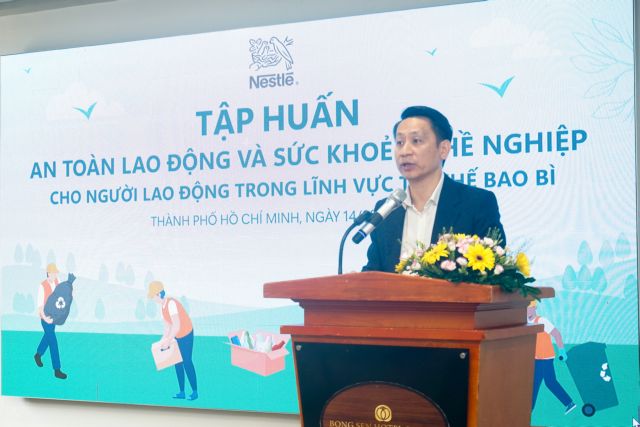Nestlé Việt Nam has organised a training programme on occupational safety and hygiene for its recycling partners, as part of efforts to build a sustainable and responsible supply chain.

HÀ NỘI — In a bid to make the nation's recycling sector cleaner, safer and more competitive, Nestlé Việt Nam has launched a training programme to improve workplace safety and hygiene among its partners—many of whom are informal or small-scale players in the circular economy.
The initiative targets businesses in the recycling industry, particularly small- and medium-sized enterprises (SMEs), helping them align with international standards while boosting compliance with the Party Central Committee’s Resolution 68/NQ-TW on innovation and sustainable development.
Deputy General Director in charge of External Relations and Communications at Nestlé Việt Nam Khuất Quang Hưng opened the event by reaffirming the company's long-term commitment to responsible and ethical business practices.
“By supporting recycling enterprises—especially SMEs—through sharing knowledge and tools to improve occupational safety practices, we aim to protect workers’ rights and contribute to a greener future. Nestlé Việt Nam remains committed to creating shared value and fostering long-term community development, with people at the heart of every activity,” Hưng said.
The training session delivered essential legal updates and covered international requirements relating to environmental compliance and labour rights within the supply chain. It also underscored the pivotal role of corporate leadership in creating a culture of responsibility, minimising risks and improving job quality in the recycling sector.
Representatives from the United Nations Development Programme (UNDP) in Việt Nam shared lessons learned from a responsible sourcing initiative in two plastic recycling value chains led by Duy Tân Recycling and Vikohasan. The project aims to improve working conditions and promote the rights of informal workers in the waste sector.
UNDP Việt Nam representative Hoàng Thành Vĩnh said informal waste workers played a crucial role in collection, transportation and recycling in Việt Nam.
“Through this initiative, we work with all stakeholders in the plastic recycling value chain to apply standards that improve working conditions and livelihoods, while ensuring their contributions are recognised,” he said.
Human Resources Director at Duy Tân Recycling Lưu Thị Kim Liên praised the programme’s practical value.
“The insights shared today will help us review and strengthen our internal procedures to comply with current regulations and create a safer working environment for our employees. We hope Nestlé Việt Nam and its partners will continue organising similar programmes in the future, contributing to a greener and more inclusive circular economy,” she said.
In the context of Environmental, Social and Governance (ESG) becoming a key driver of sustainable growth, businesses are paying greater attention not only to environmental aspects but also to social responsibility and governance.
As a pioneer in ESG practices, Nestlé has rolled out various initiatives to contribute to community prosperity under its “Creating Shared Value” philosophy. — VNS





